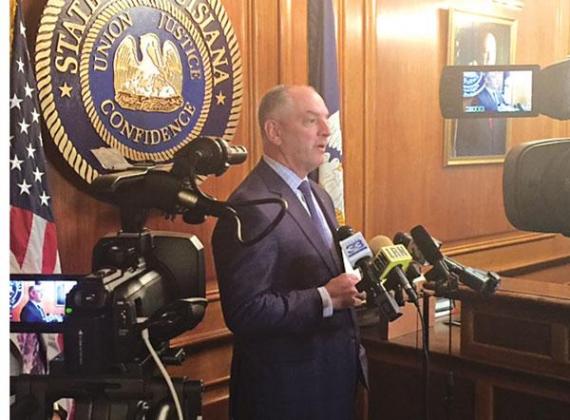
Caitie Burkes/Manship News Service
Rep. Sam Jones, D-Franklin, voluntarily pulled his controversial corporate activities tax bill from consideration Tuesday following a day and a half of testimony before the House Committee on Ways and Means in which various business interests and most of the Republican committee members expressed staunch opposition.
Because Jones voluntarily deferred his House Bill 628, it can be brought before the committee again. It is Gov. John Bel Edwards revenue-raising centerpiece to balance the budget.
“This has brought us to a point of catharsis,” Jones said after explaining his conversations with political leaders were ongoing.
The committee also deferred the four other bills on the agenda, including Jones’ bills regarding a minimum corporate income tax and a Louisiana margins tax, as well as legislation by Rep. Kenny Havard, R-Jackson, levying an oil refinery tax and a general business tax.
Representatives for businesses ranging from pizzerias to oil and gas entities rallied against the amended HB628, which would impose a 0.35 percent tax on certain companies’ gross receipts and also impose a lesser alternative fee to smaller businesses.
Jones offered the bill as a way to solve the state’s $1.3 billion “fiscal cliff” that will occur in the next fiscal year when a temporary increase in the sales tax sunsets.
Scott Drenkard, director of state projects for the Washington-based Tax Foundation, used an “old school visual aid” to illustrate the errors of a gross receipts taxes, which he said have historically not fared well in the economic literature.
He pinpointed the tax model’s key economic problem on one phenomenon — tax pyramiding, which he described as “stacking taxes on top of taxes” in a non-transparent way.
Drenkard said many states, including New Jersey, Michigan, Kentucky and Indiana, have stepped away from this type of tax in recent years because it perpetuates a negative business climate and encourages vertical integration.
“The name of the game is neutrality,” Drenkard said.
Instead, Drenkard argued for structural reform in Louisiana’s tax system, specifically for a broader tax base and lower rates.
Among the list of business leaders who opposed the bill was Caddo Parish Alliance founder Dan McCormick, who also runs an oil company. McCormick said he started the alliance as a way to inform Louisiana residents of different taxes imposed in their geographic areas.
McCormick said the Legislature has been taxing him on his expenses and not his profits, including increased electric bills, Office of Conservation fees and the 1 percent sales tax. The $35,000 annual tax increase has led him to let go of nine of his 14 employees.
“If I understand what you’re telling me,” said Rep. Jim Morris, R-Oil City, “We’re basically putting your company out of business.”
Morris explained that when most legislators think of oil companies, Exxon and Shell Oil pop into mind rather than the many “mom and pop oil companies” in Louisiana which would be most impacted by the legislation.
Donny Rouse, CEO of Rouse’s Supermarkets, stressed the bill’s potentially negative effects on the grocery industry. Rouse said if HB628 passes, the chain may have to cease accepting money orders and gift cards should those be considered gross receipts.
“CAT puts our business at the losing end,” Rouse said.
